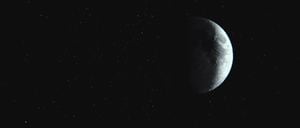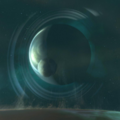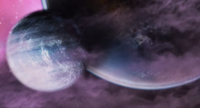Natural satellite: Difference between revisions
From Halopedia, the Halo wiki
m (adding archive fields to ref/site) |
m (Ref/Site template parameter standardisation) |
||
| Line 3: | Line 3: | ||
{{Center|''Looking for [[Earth]]'s moon, [[Luna]], or [[Moons (game)|moons]], the pool variant?''}} | {{Center|''Looking for [[Earth]]'s moon, [[Luna]], or [[Moons (game)|moons]], the pool variant?''}} | ||
[[File:H2A - Luna.jpg|thumb|right|300px|Luna, Earth's only natural satellite.]] | [[File:H2A - Luna.jpg|thumb|right|300px|Luna, Earth's only natural satellite.]] | ||
A '''natural satellite''', referred to as a '''satellite'''{{Ref/Site|D=01|M=6|Y=2020|URL=https://www.halowaypoint.com/en-us/universe/locations/earth| | A '''natural satellite''', referred to as a '''satellite'''{{Ref/Site|D=01|M=6|Y=2020|URL=https://www.halowaypoint.com/en-us/universe/locations/earth|Site=Halo Waypoint|Page=Universe - Earth}}{{Ref/Site|D=01|M=6|Y=2020|URL=https://www.halowaypoint.com/en-us/universe/locations/alluvion|Site=Halo Waypoint|Page=Universe - Alluvion}}{{Ref/Site|D=01|M=6|Y=2020|URL=https://www.halowaypoint.com/en-us/universe/locations/mars|Site=Halo Waypoint|Page=Universe - Mars}} or '''moon''',{{Ref/Site|Id=meridian|D=01|M=6|Y=2020|URL=https://www.halowaypoint.com/en-us/universe/locations/meridian|Site=Halo Waypoint|Page=Universe - Meridian}}{{Ref/Site|Id=threshold|D=01|M=6|Y=2020|URL=https://www.halowaypoint.com/en-us/universe/locations/threshold|Site=Halo Waypoint|Page=Universe - Threshold}} is a celestial body that orbits a [[planet]] or smaller body, which is referred to as a "gravity anchor".{{Ref/Reuse|meridian}} Moons vary widely in size, surface features, or atmosphere. | ||
==Overview== | ==Overview== | ||
Some natural satellites were only [[asteroid]]s captured by a planet's orbit, such as [[Reach]]'s smaller moon [[Turul]].{{Ref/Site|Id=moonsinfo|D=01|M=6|Y=2020|URL=http://carnage.bungie.org/haloforum/halo.forum.pl?read=1045222| | Some natural satellites were only [[asteroid]]s captured by a planet's orbit, such as [[Reach]]'s smaller moon [[Turul]].{{Ref/Site|Id=moonsinfo|D=01|M=6|Y=2020|URL=http://carnage.bungie.org/haloforum/halo.forum.pl?read=1045222|Site=halo.bungie.org|Page=I've got your answer, Levi...}} Other moons are the size of planets, such as [[Basis]] which is nearly twice the size of [[Earth]].{{Ref/Site|D=01|M=6|Y=2020|URL=http://nikon.bungie.org/misc/sloftus_planetscale|Site=halo.bungie.org|Page=Halo-verse Planetary Scale}} | ||
There are a number of planets that have extensive systems of moons, like [[Threshold]] and its 12 satellites,{{Ref/Reuse|threshold}} or [[Vitalyevna]] and its 27 moons.{{Ref/Site|D=01|M=6|Y=2020|URL=https://www.halowaypoint.com/en-us/universe/locations?page=2| | There are a number of planets that have extensive systems of moons, like [[Threshold]] and its 12 satellites,{{Ref/Reuse|threshold}} or [[Vitalyevna]] and its 27 moons.{{Ref/Site|D=01|M=6|Y=2020|URL=https://www.halowaypoint.com/en-us/universe/locations?page=2|Site=Halo Waypoint|Page=Universe - Locations - Page 2}} | ||
==List of known moons== | ==List of known moons== | ||
Revision as of 09:24, April 4, 2021
| There is more information available on this subject at Natural satellite on the English Wikipedia. |
A natural satellite, referred to as a satellite[1][2][3] or moon,[4][5] is a celestial body that orbits a planet or smaller body, which is referred to as a "gravity anchor".[4] Moons vary widely in size, surface features, or atmosphere.
Overview
Some natural satellites were only asteroids captured by a planet's orbit, such as Reach's smaller moon Turul.[6] Other moons are the size of planets, such as Basis which is nearly twice the size of Earth.[7]
There are a number of planets that have extensive systems of moons, like Threshold and its 12 satellites,[5] or Vitalyevna and its 27 moons.[8]
List of known moons
- Main article: [[:
- Category:Moons|
- Category:Moons]]
Gallery

|
Browse more images in this article's gallery page. |
Csodaszarvas and Turul, the two natural satellites of Reach.
Sources
- ^ Halo Waypoint, Universe - Earth (Retrieved on Jun 1, 2020) [archive]
- ^ Halo Waypoint, Universe - Alluvion (Retrieved on Jun 1, 2020) [archive]
- ^ Halo Waypoint, Universe - Mars (Retrieved on Jun 1, 2020) [archive]
- ^ a b Halo Waypoint, Universe - Meridian (Retrieved on Jun 1, 2020) [archive]
- ^ a b Halo Waypoint, Universe - Threshold (Retrieved on Jun 1, 2020) [archive]
- ^ halo.bungie.org, I've got your answer, Levi... (Retrieved on Jun 1, 2020) [archive]
- ^ halo.bungie.org, Halo-verse Planetary Scale (Retrieved on Jun 1, 2020) [archive]
- ^ Halo Waypoint, Universe - Locations - Page 2 (Retrieved on Jun 1, 2020) [archive]



